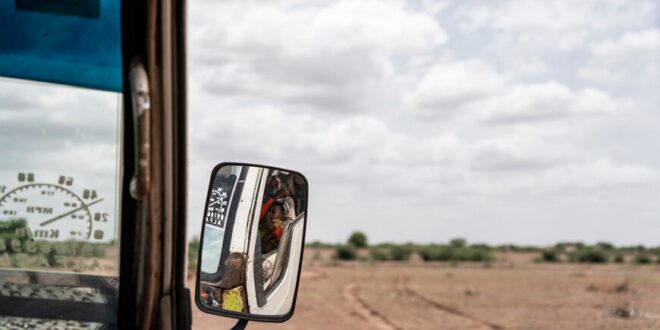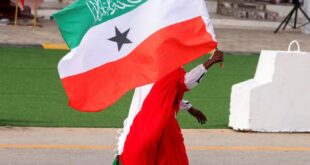In the wake of the Sudan coup on Oct. 25, some observers believe Ethiopia will take the opportunity to further its claims in a border dispute with Khartoum.
Following the military coup against the transitional authority in Sudan on Oct. 25, concerns have been raised about Ethiopia taking advantage of the resulting turmoil to renew the border dispute with Khartoum, which could cast a shadow over the already volatile region.
Ethiopia and Sudan have been locked in a decades-old conflict over 260 square kilometers (162 square miles) of the al-Fashqa area, a patch of fertile border land from which Khartoum expelled thousands of Ethiopian farmers in mid-December 2020. The move led to clashes between the two countries’ forces, claiming dozens of lives on both sides.
Large numbers of Sudanese forces have since been stationed in the area to maintain control and stability in the Horn of Africa region.
Ethiopia accuses Sudan of exploiting its preoccupation in the Tigray war and of seizing Ethiopian lands, allegations Khartoum has denied. It declared full control over its “occupied lands” in al-Fashqa in late 2020.
Al-Fashqa is located on the border between the two countries where the northwest Ethiopian Amhara region meets the state of Qadarif on Sudan’s eastern border.
Sudan says that this area falls within its borders, which were demarcated at the beginning of the twentieth century.
The situation in Sudan, which has been struggling to get through the fragile transitional phase since President Omar al-Bashir was overthrown in April 2019, became more complicated when army chief Abdel Fattah al-Burhan dissolved the civilian government and the Sovereignty Council that runs the transitional phase on Oct. 25. Burhan’s coup was met with great international condemnation.
Protests and strikes swept the country as civil and professional forces called for comprehensive civil disobedience until Burhan reverses the move. Confrontations with security forces escalated in several areas.
Eric Reeves, a Sudan analyst at Smith College, told Al-Monitor that the security situation has deteriorated badly in the greater Khartoum area. He said, “The longer the military controls the country, the more insecure it will become. Anger will only increase among the protesters as time passes and this will lead to more bloodshed. The military can hold on but at a terrible cost.”
In the wake of a failed coup attempt in Sudan in September, for which officers and civilians affiliated to Bashir’s regime were blamed, the Sudanese authorities announced that they had thwarted an attempt by the Ethiopian army to invade al-Fashqa. The Ethiopian authorities making any such move.
At the time, Brig. Gen. Al-Taher Abu Haja, spokesperson for the Sudanese army, said that the Sudanese forces repelled an attempt by Ethiopian forces to invade the Umm Barakit area of al-Fashqa, forcing them to retreat. Abu Haja told the Turkish Anadolu Agency Sept. 26 that the army will never allow Ethiopian forces to enter al-Fashqa again.
Tensions on the border between the two countries have worsened since the conflict erupted in Ethiopia’s northern Tigray region, prompting tens of thousands of refugees, mostly from the region, to flee to areas in eastern Sudan.
International efforts by Saudi Arabia, Turkey, Russia and the UAE to mediate between Sudan and Ethiopia have failed. Sudan refuses to engage in negotiations before a re-demarcation of the border is carried out and Ethiopia recognizes the al-Fashqa area as Sudanese land.
Washington fears that the army’s seizure of power in Sudan may push Ethiopia to try to exploit the situation in the border dispute between them.
Kjetil Tronvoll, a professor of peace and conflict studies at Oslo New University College, told Al-Monitor that Ethiopia will not mobilize militarily in its current border conflict with Sudan.
Tronvoll said, “I seriously doubt Ethiopia has the military capacity to launch an offensive to reclaim control of al-Fashqa, under the current circumstances. The Abiy Ahmed regime is nearing a collapse, as Tigray Defense Forces, in collaboration with The Oromo Liberation Army, is closing in on Addis Ababa.”
The Ethiopian authorities are struggling to stop the rebels from advancing. On Nov. 2, they declared a nationwide state of emergency, fearing the Tigray rebels could advance toward Addis Ababa. Earlier, the authorities in the capital issued directives to residents to register their weapons and prepare to defend themselves and their neighborhoods.
Addis Ababa has become a target for the rebels, who have an outpost 380 kilometers (236 miles) away. The Tigray People’s Liberation Front (TPLF) claims to have seized control over the towns of Dessie, Kombolcha and Burka in the Amhara region. A federal government spokesman denied reports that Dessie and Kombolcha had fallen, but later issued a statement saying that “infiltrators” had killed 100 young men in Kombolcha.
Fighting first erupted in Tigray in November 2020, when the Ethiopian government accused the TPLF of attacking an army base. The Ethiopian government declared victory three weeks later when it captured the regional capital, Mekele, but the TPLF continued to fight and has since recaptured most of Tigray, including Mekele.
However, reports showed that human rights violations continued in the area, where thousands of civilians were killed. In July, the battles expanded to the regions of Afar and Amhara, bordering Tigray. About 5 million people in Tigray depend on emergency aid, while 400,000 people face starvation, the United Nations reported.
The TPLF had dominated the political scene in Ethiopia for nearly three decades but lost much of its influence when Ahmed rose to the premiership in 2018 following anti-government protests. Relations with the TPLF deteriorated after it accused Ahmed of ruling the country favoring the center of the country and neglecting the other states.
The United States urged the rebels not to attempt to capture Addis Ababa, while UN Secretary-General Antonio Guterres reiterated his call for an “immediate cessation of hostilities, unrestricted humanitarian access to deliver urgent life-saving assistance, and an inclusive national dialogue to resolve this crisis.”
US special envoy for the Horn of Africa Jeffrey Feltman is visiting Ethiopia Nov. 4 and 5 to attempt to restore calm between the Ethiopian parties. Meanwhile, Washington is considering imposing sanctions on all parties in Ethiopia.
Tronvoll said that the Ethiopian government is currently in a desperate fight to survive in Addis Ababa and does not have time nor resources to utilize the Sudan crisis to its advantage.
He added, “As both Khartoum and Addis Ababa are struggling with dire internal crisis, none of them seem likely to prioritize the common border conflict in the near future.”
“However, from a Sudanese military perspective, it might be opportune to create an external crisis to deflect the internal criticism, hence the al-Fashqa or the GERD dispute may come into play in such a perspective,” Tronvoll concluded.
 Eurasia Press & News
Eurasia Press & News



